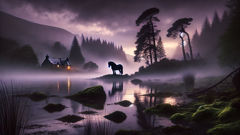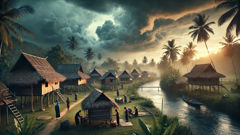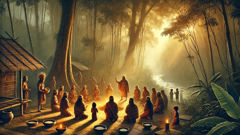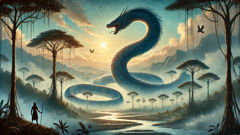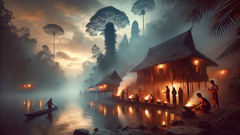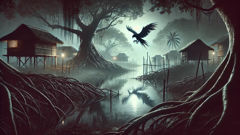Introduction
Mist curled over the surface of Loch Cùil, blurring the boundary between water and sky in the gentle twilight. The scent of peat smoke mingled with the earthy aroma of damp moss, drifting from the thatched cottages nestled between the ancient pines and the rocky shoreline. To the villagers of Glenbrae, the loch was both a giver and a taker—a source of trout and fresh water, but also a place of old superstitions and whispered warnings. On windless nights, when the surface lay so still that it mirrored the bruised purple of the evening clouds, elders recalled tales of the kelpie, a shape-shifting water spirit as beautiful as it was deadly. Some swore they’d seen a magnificent black horse with a wild mane grazing at the water’s edge, only for it to vanish the moment they blinked. Others spoke of spectral laughter echoing over the reeds, or glimpses of a pale hand beckoning from beneath the surface. For generations, parents forbade their children from wandering near the loch after dusk, for fear that the kelpie would lure them into its cold embrace. Yet, for all its terror, the legend drew Isla McGregor like a moth to flame. Born in a storm that swept across the glen, Isla had always felt the pull of the loch’s secrets. Now, as she crossed the dew-laden meadow toward the water, her heart thrummed with a mixture of dread and wonder. She carried with her not just her father’s old lantern but questions that had haunted her since childhood—about the kelpie, about courage, and about the shadows that lingered where land met water.
The Whispering Waters
Isla moved quietly through the tall grass, lantern swinging from her hand and casting trembling halos onto the ground. The air around Loch Cùil was thick with expectation, every ripple in the reeds amplified by the hush of evening. In Glenbrae, the loch had a life of its own. It whispered through dreams and echoed in the crags. Every villager bore its mark, from the fishermen who watched the tides as if reading an ancient script, to the children whose games always ended with glances over their shoulders. But Isla’s relationship with the loch was different. She didn’t just fear it; she longed to understand it.
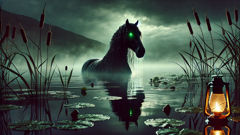
Her earliest memories were of listening to her grandmother, Moira, spinning tales beside the peat fire. Moira’s voice was smoky and low, winding through stories of selkies and faeries and, always, the kelpie. "It’s not just a beast, lass," she’d said once, brushing silver hair away from her face. "It’s a warning. The loch’s not for pride or greed. You pay its price if you forget respect."
Isla had never seen a kelpie. But she’d found hoofprints in the soft mud after heavy rains—prints that vanished into water with no sign of a return. She’d seen reeds bent as if by something large and heavy moving through them, and sometimes, on the coldest nights, she’d dreamt of a horse with wild eyes and a mane tangled with riverweed. The village laughed at her curiosity. Her mother called it dangerous. But Isla couldn’t ignore the feeling that something watched her from beneath the mirror-black surface.
That night, a heavy quiet hung over Glenbrae. The moon, veiled by drifting clouds, offered only a faint silver glow. Isla reached the shore, her boots squelching in mud. She knelt, letting the lantern’s light flicker across the shallows. The water reflected nothing but darkness, yet she felt as though it hungrily drank in every ray. She whispered, "If you’re real, show yourself."
A sudden chill raced up her spine. The reeds parted, and a ripple disturbed the silence. For an instant, she saw a pair of luminous eyes staring up at her—green as emeralds, sharp as broken glass. Then the vision was gone. Isla stumbled back, heart pounding, but instead of running, she drew a deep breath. She’d always known the loch’s stories were more than warnings. They were invitations to mystery.
The next morning, Isla woke to news that the village’s prized mare had vanished. The stable boy found the gate wide open, hoofprints leading straight down to the water’s edge and stopping abruptly. The villagers muttered about thieves, but Isla saw the look of fear in their eyes. Her grandmother’s warnings echoed in her mind. She resolved to uncover the truth, even if it meant defying her family and the village elders.
Armed with her lantern, a small knife, and her grandmother’s silver brooch—said to ward off fae magic—Isla set out again that evening. This time, she ventured deeper along the loch, to a place where black rocks jutted from the water like broken teeth. The air here felt older, heavier with secrets. It was here, as dusk deepened, that she heard it: a low, melodic whinny, sorrowful and haunting. The sound drew her closer until she saw it—a magnificent black horse grazing on water-lilies, mane glistening with droplets. Its eyes met hers, intelligent and ancient.
She approached slowly, speaking softly, "Are you what they fear? Or what they’ve forgotten?"
The kelpie regarded her in silence. For a moment, its form wavered—the outline of a man flickered at the edge of her vision before resolving back into the horse. Isla’s breath caught. The creature radiated both loneliness and danger. She understood then: the kelpie was not just a beast of vengeance but a spirit bound to the loch, shaped by centuries of human fear and longing. She knelt, holding out her grandmother’s brooch. The kelpie stepped forward, nostrils flaring. Its muzzle brushed her hand, cold as river stone.
In that instant, images flooded Isla’s mind: villagers long ago making offerings at the shore; a pact broken; a sorrowful promise echoing through generations. The kelpie’s voice filled her thoughts, mournful and wise. "Respect the water. Remember the old ways."
As dawn painted the sky with streaks of gold, Isla returned to Glenbrae changed. She carried with her a burden of knowledge—and a new fear. The kelpie was not gone. It watched. It waited. And if the village failed to remember, it would return again.
A Bargain in Moonlight
The weeks that followed were restless ones for Isla. Her nights were filled with dreams of the kelpie—sometimes horse, sometimes man—always watching her from just beyond the veil of mist. She awoke each morning with a memory of cold water on her skin and the sound of hooves pounding on stone. The village, too, was uneasy. Livestock disappeared without a trace, and those who fished near the black rocks spoke of strange shapes beneath their boats and sudden chills that set their teeth chattering even on mild days.
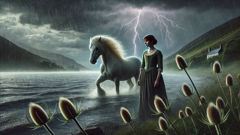
Glenbrae’s council convened in the longhouse, candles flickering as the elders debated what to do. Some demanded rituals: the burning of offerings or the ringing of iron bells to drive away evil. Others insisted it was all the work of clever thieves or wild wolves. Only Isla dared speak of what she’d seen. "The kelpie wants to be remembered," she insisted. "It’s bound by an old promise—and we’ve forgotten."
Her words stirred discomfort. The village priest denounced superstition, but Moira defended her granddaughter. "Respect for the spirits kept this village safe for centuries. Turn your back now, and you risk far more than lost sheep."
One evening, as a storm threatened and thunder echoed across the glen, Isla was drawn back to the loch. She carried with her a loaf of oat bread and a flask of whisky—humble offerings from her own hands. Lightning illuminated the water, revealing the kelpie waiting on a spit of land where wild thistles grew. Its mane shimmered with an unnatural light, and its eyes shone like lanterns in the darkness.
Isla approached without fear. She placed her offerings at the water’s edge, then knelt beside them. The kelpie watched her, shifting between forms in the flickering stormlight. For a moment, it was a tall, pale man cloaked in riverweed, then once more a wild stallion. Its voice—soft as wind through reeds—echoed in Isla’s mind: "You remember, but your village has forgotten. Will you pay the price for them?"
She didn’t hesitate. "If a bargain must be struck, let it be with me."
The kelpie circled her, hoofbeats muffled by the rain. It lowered its head until its icy breath brushed her cheek. "Swear on your blood that you’ll restore the old ways. Offer respect, remember the pact. If you fail, you are mine."
Lightning flashed again, illuminating Isla’s determined face. "I swear," she whispered.
The kelpie pressed its forehead to hers. A searing cold flooded her veins, then faded. The storm broke overhead, rain drumming the surface of the loch. As quickly as it had appeared, the kelpie slipped beneath the water, leaving only ripples and a single black hair curling in the foam.
From that night on, Isla carried an invisible weight. The kelpie’s mark tingled on her skin—a faint, silvery scar where its breath had touched her. She redoubled her efforts to revive old traditions: cleaning the loch’s banks, teaching children to offer thanks before drawing water, urging the village to remember the stories that kept their world in balance. Some mocked her, but others listened. Bit by bit, the loch’s dark mood eased. Fewer animals vanished. The mist seemed less oppressive.
Yet Isla knew the bargain was not so easily won. Every full moon, she dreamed of the kelpie—sometimes gentle, sometimes wrathful. It tested her resolve, sending riddles and visions that left her shaken. Through it all, she clung to her grandmother’s wisdom: courage was not the absence of fear, but the will to face what hid in the dark.
Conclusion
In time, Glenbrae changed. The old fears faded, but so did the reckless pride that once threatened the balance between village and loch. Isla grew into a woman both respected and feared—keeper of stories, guardian of the water’s edge. Children learned to greet the loch each morning and whisper a blessing each night. Travelers passing through spoke of the wild beauty of Loch Cùil, but also of a presence in its depths: a spirit neither wholly friend nor foe, forever watching.
Isla never forgot her bargain. Each year on the anniversary of her promise, she walked alone to the black rocks and left a gift for the kelpie: bread, whisky, and a lock of her own hair. Sometimes, in the dusk, she caught sight of a dark shape gliding through the shallows or heard a distant whinny on the wind. In those moments, fear gave way to wonder—and gratitude. She understood now that legends weren’t just warnings; they were guides to living with humility and courage, honoring what could never be fully tamed.
The legend of the kelpie endured long after Isla’s own story faded into memory. Some claimed she joined the spirit in the water, becoming part of the loch’s eternal mystery. Others said she lived a long life, teaching each generation to respect the unseen world. Whatever the truth, her legacy remained in every ripple on Loch Cùil—a reminder that beneath beauty and danger alike lies a wisdom as deep as the waters themselves.

